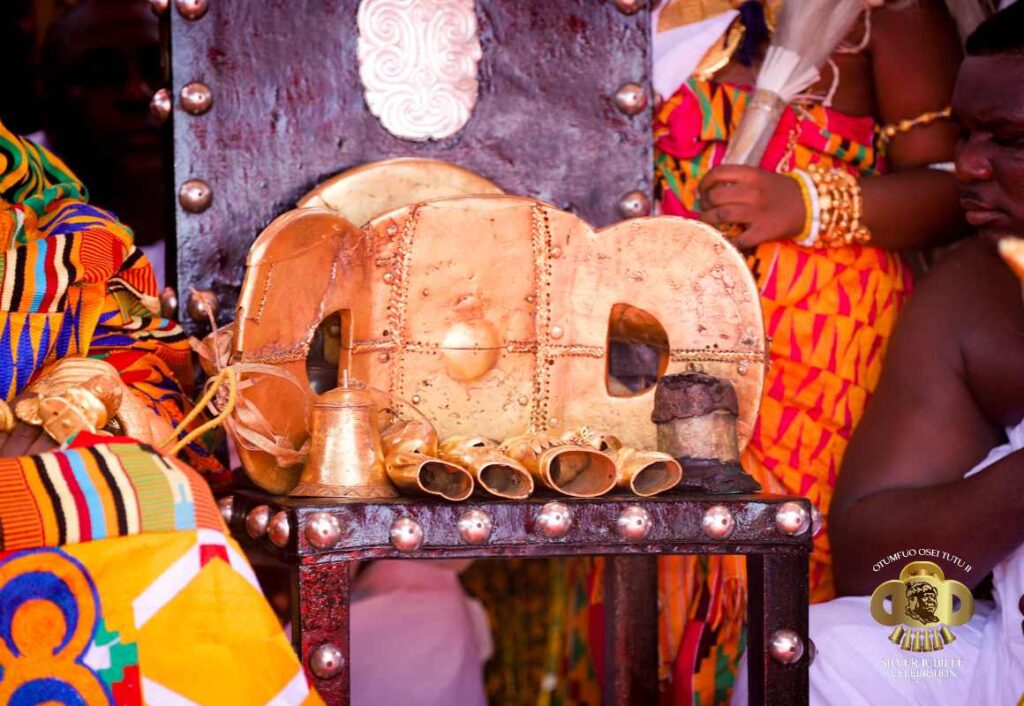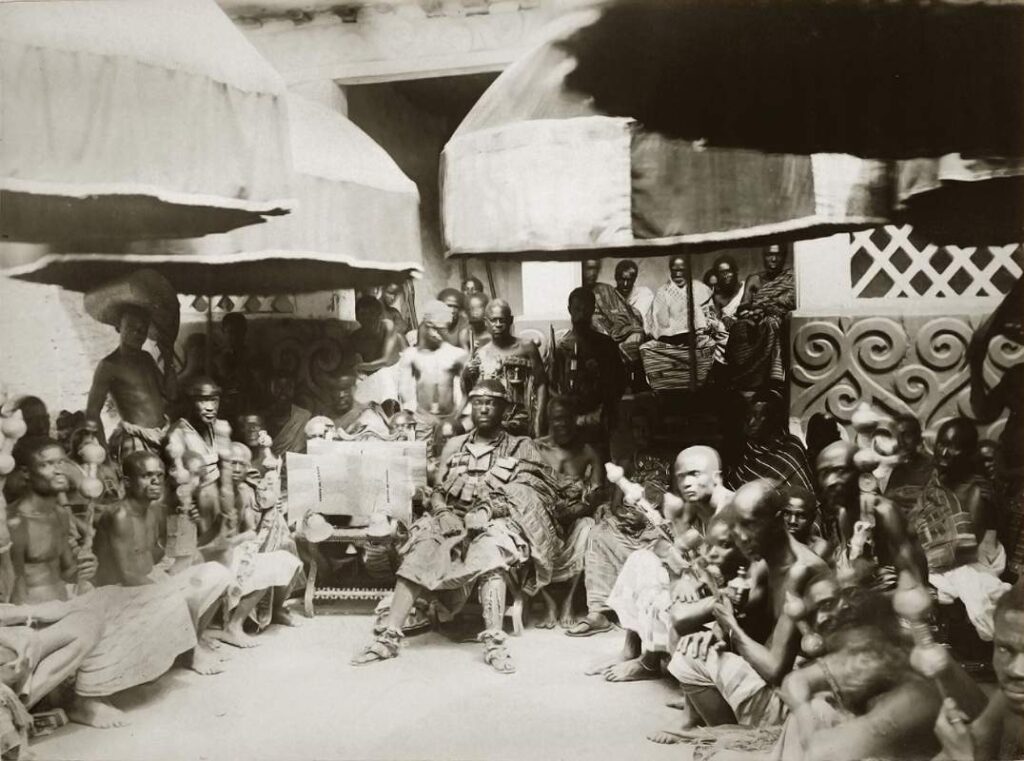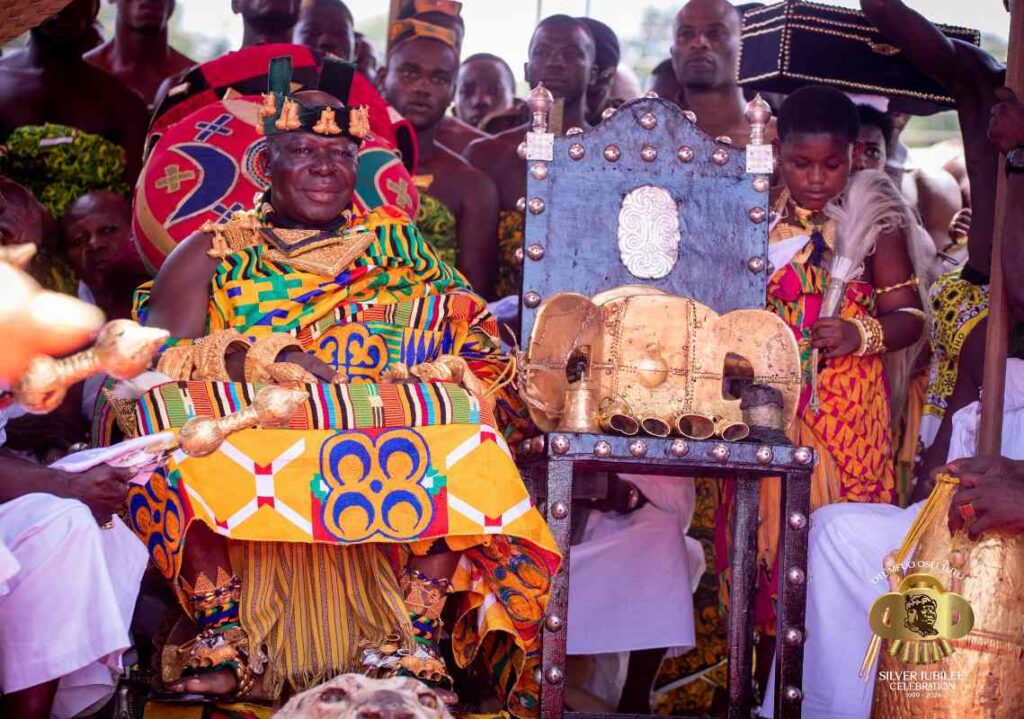“If you, the men of Asante, will not go forward, then we will. We, the women, will,” Yaa Asantewaa thundered angrily.
The Queen Mother of the Asante Kingdom was fed up with the intimidation by the British. She was ready for war.
The colonial forces of Britain had committed sacrilege against the Asante nation. Some days before, the British had desecrated the very symbol of the Asante Kingdom – the Golden Stool.
Their Gold Coast Governor, Sr. Frederick Mitchell Hodgson, dared to sit on it. It was a taboo. This explained Yaa Asantewaa’s anger.
The Golden Stool — Sika Dwa Kofi, “the Golden Stool born on a Friday,” is the royal and divine throne of the kings of the Asante Kingdom.
They had also captured her son, the King, Asantehene Prempeh I.
Additionally, the British detained her grandson, Kofi Tene, who was also a leader and an influential figure in the land. However, the council of decision-makers was hesitant to challenge their oppressors, so she had to step in.
“Now I have seen that some of you fear to go forward to fight for our King,” she stated bluntly. “If it were in the brave days of Osei Tutu, Okomfo Anokye, and Opoku Ware, leaders would not sit down to see their King taken away without firing a shot,” she challenged them.
“No white man could have dared to speak to a leader of the Ashanti in the way the Governor spoke to you this morning,” she stated further.

These words energized her people. She eventually led the Asante army to the battlefield to fight the War of the Golden Stool. In the end, she carved her name on the list of courageous women who rose to resist colonial repression and defend African identity.
However, thousands of people on both sides died in the process. The question is, why was this stool so important?
The Golden Stool that Holds a People
The Golden Stool — Sika Dwa Kofi, “the Golden Stool born on a Friday,” is the royal and divine throne of the kings of the Asante Kingdom, which is in present-day Ghana. But it is more than just a throne.
Believed to contain the souls of the dead, the living, and the yet unborn, it is the most precious and spiritually significant treasure of the Asante people. To sit on it was to insult the pillar of Asante identity.
The Golden Stool was actually made of wood but covered in gold. It is held in sacred esteem by millions of Asante people. Every Asante chief has a stool. It is a symbol of authority and ancestral continuity. But there is only one Golden Stool.
Legend has it that in the late 17th century, Okomfo Anokye, a priest and confidant to Osei Tutu I, the founder of the Asante Kingdom, caused the stool to fall from the sky.
After some incantations, the object dropped straight into the laps of Asante’s first king. Since then, the stool has represented sovereignty and divine protection.
Entangled Crowns: Asante and the British Empire
The Asante people were living their lives when they were interrupted by the British. The empire was prosperous. Initially, they were one of the Akan people who were subjects of the Denkyira Empire. But by the 1670s, power changed hands.

Osei Tutu dethroned the Denkyira and made Asante the dominant force in the region. About 30 years later, Osei Tutu, who controlled the region’s gold, had invested much of the new wealth in the military.
The kingdom was known for its dominance in agriculture and commerce. Aside from gold, it traded in slaves and ivory. With the proceeds and its strengthened army, it conquered more land and continued to expand.
But the British interrupted its advancement. After they landed on the West African soil, they began to snatch territory from the locals. By the late 19th century, the tussle for dominance between the Asante Kingdom and the colonialists had heightened.
In 1900, the governor of the Gold Coast, Sir Frederick Mitchell Hodgson, did the unthinkable. He publicly declared his desire to sit on the Golden Stool.
The British sought to extend their control into much of the Asante territory. They saw the West African Gold Coast as a strategic location for commerce. Utilizing a combination of diplomatic efforts, military raids, and political intervention, they successfully penetrated the Asante resistance.
As they gained more ground in the empire, they never bothered to understand its deep symbolic systems. This, alongside their colonial arrogance, led to a brash request that escalated things.
The Spark: Sir Frederick Hodgson and the Demand That Could Not Be Made
In 1900, the governor of the Gold Coast, Sir Frederick Mitchell Hodgson, did the unthinkable. He publicly declared his desire to sit on the Golden Stool.
This was considered by the Asante people an insult of the highest degree. It turned out to be a grave political mistake.

Before that, Hodgson and the Asantehene (King of the Asante Kingdom) fell out over the terms of a treaty. The governor had fined the King for defaulting on his end of the agreement.
The governor humiliated the king publicly, detained him and his son, and ordered their exile. After this, Hodgson traveled to Kumasi, the Asante capital, in a bid to further strip the kingdom of its sovereignty.
It was there that the stool issue came up. He even ordered his men to begin a search for the sacred item.
The people of Asante were enraged. A full-scale rebellion and revolt broke out. This was where Yaa Asantewaa’s bravery came into play.
Yaa Asantewaa: Queen Mother, War Leader, and Symbol
When it became necessary to face the British, only Yaa Asantewaa was prepared. As queen mother, she already held considerable political influence. Akan culture bestowed on her office the right to nominate rulers and mobilize women and elders.
She was also one of the official custodians of Asante culture. But she was more than a political officeholder. She was a fearless warrior.
Yaa Asantewaa and her soldiers took position in fortified locations from where they ambushed the opposition forces.
She suggested to the council that the stool, one of the most sacred African artifacts, be protected at all costs. But she wasn’t all talk. She matched words with action.
Yaa Asantewaa mobilized soldiers and started the legendary Anglo-Asante War. Under her leadership, the Asante launched guerrilla warfare against the British. They attacked the foreigners from the forest and disorganized them.
The War in the Bush: Tactics, Courage, and Resilience
Although the British had superior firepower, the Asante made up for it in other areas. For example, the locals were more mobile and tactical.

They had a better understanding of the forest. This helped them outshine the British on numerous occasions. Yaa Asantewaa and her soldiers took position in fortified locations from where they ambushed the opposition forces.
Although the British later invaded Asante land and unleashed devastating violence on the residents, the queen mother and her men had already made a huge statement.
When men cowered, she stood tall. She is the reason the Golden Stool was never lost.
The Asante people proved that they were not pushovers, even though they lost about 2,000 soldiers in the war. The British side suffered about 1,000 deaths before they succeeded in overrunning their opponents. Yet, they failed to seize the stool from the Asante.
The Asante hid the stool and preserved their prized cultural symbol. This was a big win for Yaa Asantewaa’s army. However, she was captured and sent into exile to Seychelles. She died in 1921, as the hero ever to be remembered by the world across generations.
Remembering Yaa Asantewaa today
Yaa Asantewaa has carved her name in Ghana’s history. She is an icon of bravery not only across Africa but also globally.
Stamps bear her pictures, and millions of students learn about her exploits in schools. She is both a national hero and an inspiration to women. When men cowered, she stood tall. She is the reason the Golden Stool was never lost.

She delivered a massive blow to colonial arrogance through her involvement in the Asante-British conflict. The Golden Stool has remained a prominent representation of Ghana’s cultural heritage. It resurfaces during festivals and enstoolment rites.
It is a reminder of Ghana’s formidable colonial resistance.
Could Asantewaa have achieved better results by negotiation rather than war? Share your thoughts.
Sources and Further Reading:
- The Asante-British War → Black Past ( 2019: “Yaa Asantewaa (mid-1800s-1921”)
- The Rise of the Asante Kingdom → BBC World Service (“Story of Africa”)
- Yaa Asantewaa’s Speech → Ghana Web (“Yaa Asantewaa”)
- The Arrival of the Golden Stool → The Slave Kingdoms (“The Slave Kingdoms II)

